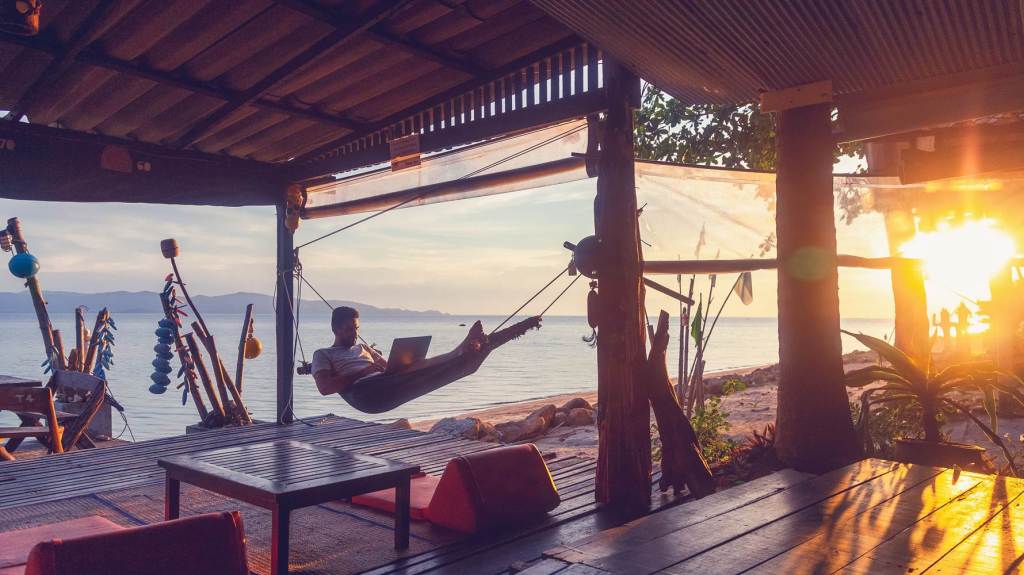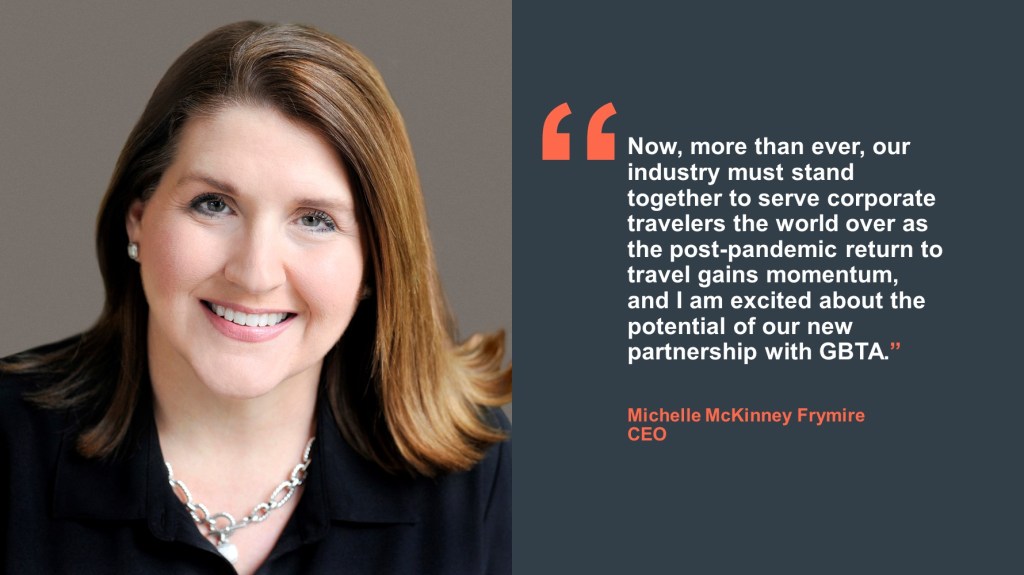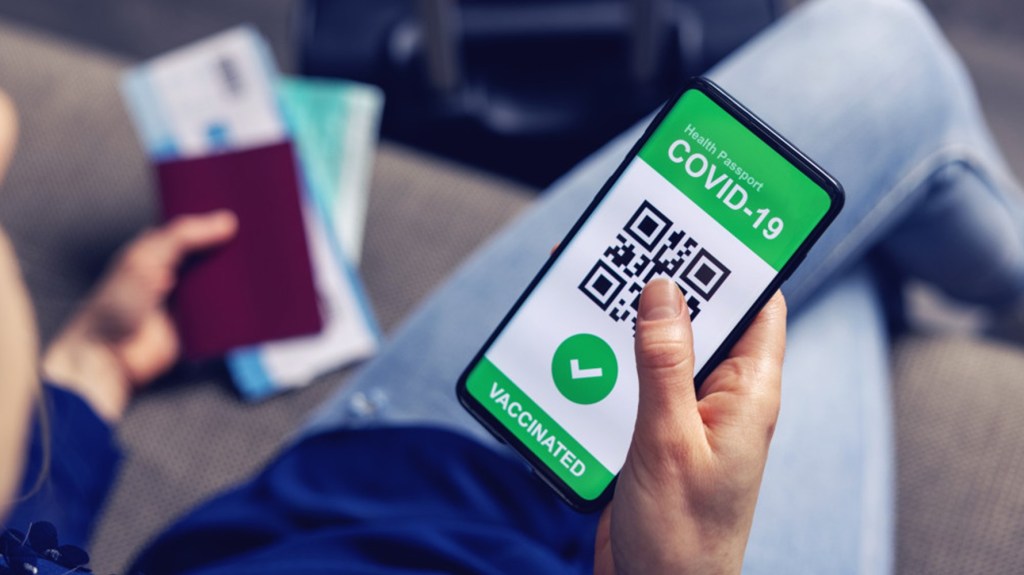Introducing the latest myCWT product and service enhancements
Building on our digital, omnichannel myCWT platform, our new products and services will simplify travel management for you and your employees – anytime, anywhere, anyhow.
Note: Featured services may not be available in your country at this time. Please reach out to your CWT representative for more details.
Hear from Chief Product Officer, Erica Antony as she shares the key product highlights of 2024, along with the key areas driving innovation.
-

2040: Baseline, Boom or Bust
As we enter an era of rapid transformation and unprecedented challenges, it is essential for travel managers, meeting & event planners, and corporate decision-makers to look ahead and frame our current strategic thinking with a clear vision of the future. Business travel and meetings and events (M&E) are poised for significant change over the next decade and a half, driven by a complex interplay of sustainability goals, technological advancements, evolving work models, and geopolitical dynamics.
In this paper to mark the 10th anniversary of our Global Business Travel Forecast, we explore, for the first time, a long-term vision of the future and potential trajectories through three distinct scenarios, each offering insights into how these forces should affect policy-making, budgeting and priorities. By examining these scenarios, we can better understand the diverse possibilities that lie ahead and the strategic imperatives required to thrive in each potential future.
Based on trajectory data analysis and interviews with industry leaders, behaviorists and climate tech founders, this forward-looking approach enables us to anticipate changes, strengthen our strategies, and make informed decisions that align long-term objectives. It is through this lens of foresight and adaptability that we can build resilience, seize opportunities, and navigate the complexities of the future.
We invite you to reflect on the insights presented, and consider how your organization can prepare for the opportunities and challenges that lie ahead. Together we can ensure that travel and meetings remain catalysts for growth, scalability and sustainable practices.
- Scenario development is both an art and a science
- Megatrends Shaping the Future of Business Travel, Meetings and Events
- Sustainability goals the new crux of corporate policy
- Technology Revolutionizes Travel Management
- Modern work models spark new travel patterns
- Changing demographics open doors to new opportunities
- Three Scenarios: Base case, boom and bust
- Future-proofing strategies

-

CWT GBTA Global business travel forecast 2025
When it comes to pricing, global business travel has finally reached an enduring, higher baseline. Prices will continue to rise in 2025, but only moderately, so expect a period of normalized growth.
However, this pricing environment, one of marginal gains and price regularity, is fragile. Global leisure travel has now realized a lot of its pent-up demand, while corporate travel has been resurgent, with 2024 edging at preCovid levels.
There are many factors at play, whether its volatile oil prices, labor costs and constraints, inflationary pressures, and geopolitical factors. As this elevated baseline edges upwards, albeit marginally, travel budgets will come under increased scrutiny, especially as travel patterns and attitudes change.
It’s why business travel can’t be viewed in a silo, and the true value to an organization must be fully realized. This forecast can help with those calculations.

-

Capitalize on emerging technologies in corporate travel
Technological advancements are accelerating at an unprecedented pace. How will emerging innovations like Generative AI, blockchain, and self-sovereign identity (SSI) transform corporate travel?
BTN and CWT probed global CEOs, travel managers, industry consultants and tech experts on the promises, questions, and expectations these innovations raise and how they are set to reshape traveler experience, cost control and service delivery in corporate travel and events.
Download and discover
- The technologies that will have the greatest impact on corporate travel in the next 2-5 years
- How these emerging technologies are poised to control costs, enhance service and security, and boost efficiency
- The critical challenges, opportunities, risks and roadblocks each innovation raises
- What travel managers, buyers and experts anticipate from these innovations

-

The long view: 3 things that everyone in the business travel industry should be monitoring over the next few years
Between industry leaders lobbying for easing of travel restrictions in time for summer holidays, and eyes and ears firmly on vaccination rollouts and the Delta variant, so much seems to be riding on the next few months.
In March, we polled our customers who said the most important enablers to see them return to business travel were widespread vaccine distribution (weighting the importance of this 4.5 out of 5) and case count reduction (weighted 3.2 out of 5). The US and UK, which are amongst the biggest business travel markets in the world, are making constant progress with their vaccination campaigns, and that’s encouraging.
According to data from the New York Times vaccination tracker, more than 3.51 billion vaccine doses have been administered worldwide, equal to 46 doses for every 100 people. But vaccine inequality remains stark.
While vaccines will certainly play an important role in making people feel confident in traveling again, a number of factors could impact the timeframe over which travel resumes. For example, much will depend on how quickly countries are able to inoculate their populations, how effective the vaccine proves to be in limiting the transmission and spread of the disease – particularly against new mutant strains of the virus, and also how long immunity lasts after vaccination.
Here are three factors to consider in understanding the outlook for global travel.
- Health issues – Travel is a potent force in the emergence, and spread of disease in geographic areas and populations. 75% of newly emerging diseases are zoonotic (transmitted between humans and animals), according to the Eco Health Alliance. Like Covid, they spread fast. Follow sources like WHO and International SOS for insight into global health concerns as they unfold.
- Political shifts –Travel restrictions and border closures directly affect and disrupt trade, freight, business travel and the supply of services that rely on the presence of individuals abroad.
- The mental health and wellbeing of your traveling employees – Stress levels can be intensified during travel (more so after a travel hiatus triggered by a global crisis) due to a lack of familiar support systems, disrupted daily routines, language barriers, culture shock and unexpected situations.
Image credits: Adobe Stock
- Health issues – Travel is a potent force in the emergence, and spread of disease in geographic areas and populations. 75% of newly emerging diseases are zoonotic (transmitted between humans and animals), according to the Eco Health Alliance. Like Covid, they spread fast. Follow sources like WHO and International SOS for insight into global health concerns as they unfold.
-

Costing the earth: The lifestyle changes our followers are willing to make for sustainability
We have had better times than the past 18 months. But there has perhaps been one silver lining. A ban on non-essential travel and lockdowns enabled us to witness – for the first time ever – what happens to our environment when normal life grinds to a halt. According to Global Carbon Project global greenhouse emissions dropped by 7% in 2020. In the first few months of 2020 it seemed that there were more blue skies in several regions, leading to a new phenomenon: ‘Blue Sky Thinking’,in which several cities worldwide are leading the way to ensure that air quality is improved permanently.
Of course, a global health crisis is not the answer to reduce greenhouse gas emissions in the long run. Still, it gave us time to reflect on the impact of our activities on our planet – including the way we travel. When skies and borders fully reopen and safe & compliant travel resumes, are we ready to make more sustainable choices?
According to a 2017 study conducted by researchers at the Lund University Centre for Sustainability Studies in Sweden (LUCSUS) the three personal choices we can make to cut greenhouse gas emissions are: reducing air travel, reducing car travel or reducing meat consumption.
Results of the poll
We polled our Linkedin followers to find out if they are prepared to make changes in their behavior for the sake of the environment. The results showed that 31% are ready to cut down on business travel but not leisure trips. People are even more keen on reducing their meat consumption (26%) instead of reducing their travel. Only a small minority would cut down on leisure travel (16%).
Another poll from YouGov pointed out that 34% of UK respondents stated that environmental sustainability affects their decisions around travel (moving up from 30% in the previous year).
The pandemic has clearly put sustainability at the top of the agenda for governments and businesses that are incorporating sustainability into their daily operations, resulting in robust targets. The UK government recently set one of the world’s most ambitious climate change targets; to cut emissions by 78% by 2035 compared to 1990 levels.
Does this mean we have to stay at home if we want to travel in a more sustainable way? Certainly not. Travelers can choose more environmentally friendly travel options. On certain routes train travel is a viable option, and the airline industry is making great strides.
Several airlines, including American Airlines, Delta Airlines and United Airlines are at the forefront of carbon neutrality targets, investing in sustainable aviation fuels. ‘Developments in sustainable aviation fuel and aircraft are necessary in order to create long-term change’, said Emily Weiss, global travel industry lead at Accenture. And she adds to that: “It will take cross-industry collaboration coupled with a more environmentally conscious consumer mindset to achieve a more sustainable future.”
Traveling responsibly is all about careful planning of your trip and wise decision-making. When planning your next trip, start asking yourself if it is essential to travel, and what choices you can make around modes of transport and suppliers. We only have one planet to live on (at least for now).
Image credits: Adobe Stock
-

CWT Exceeds 2020 Messaging Program Goals
CWT, the Business-to-Business-for-Employees (B2B4E) travel management platform, today announced it has reached a milestone in its messaging solution service, with over 750 corporations in more than 110 countries now actively using the service. After an initial launch with 25 clients in late 2019, CWT saw 300 clients adopt the service across 2020 (a 50% increase on CWT’s own program goals set for that year) with a further 425 additional clients signed-up to and actively using messaging as of 30 June 2021.
“We set ourselves a target of truly being where our customers need us in January 2020, prior to the reality of the global pandemic setting in,” said Niklas Andreen, CWT’s President Customer and Travel Experience. “Rapidly, messaging became a critical platform and service tool, relied upon by our teams, our customers and their travelers, as the world grappled with travel grinding to a halt, due to the pandemic.”
Andreen continued, “For many customers, it has become the most popular support channel for 24/7 service, guidance and information sourcing. There are now many customers where messaging makes up more than 40% of their offline contacts. Simply put, it has become a channel of choice for convenient, text based responses whether from the mobile or desktop. Additionally, the integration of messaging into our customer’s normal messaging solutions such as Microsoft messaging – means it is right at their fingertips – instead of having to use separate applications or finding a phone number.”
The CWT messaging team delivered all its 2020 targets and innovations, highlights of which include:
- Almost quadrupling messaging market presence, having increased presence from 31 countries upon launch, to 112 markets today
- 24/7 follow-the-sun configuration, ensuring availability when the traveler needs it
- A multi-technology platform allowing access via Microsoft Teams, Facebook Workplace and myCWT
- Inclusion of Spanish language capabilities
- Incorporating messaging interactions side by side with phone and email in CWT´s leading counselor travel platform
- CWT counselors manage all traveler messaging through the newly integrated one screen desktop introduced in 2019.
CWT is a leading global partner in business travel, meetings, and events. Operating across six continents, we deliver sustainable, tailored solutions that help organizations connect, engage, and thrive in an evolving world. Our myCWT platform integrates advanced technology with human expertise to simplify travel and enhance traveler and attendee experiences. Extensive global coverage, seamless data integration, AI-driven analytics, and carbon-conscious travel tools enable businesses to optimize their travel and meetings programs while delivering measurable value.
With 150 years of industry experience and a deep commitment to partnership, CWT collaborates with clients to shape the future of business travel and events, making them more efficient, responsible, and impactful.
-

Can creativity boost inclusion?
An inclusive and diverse culture gives companies a competitive edge, boosting innovation and productivity.
But as companies around the world continue to focus on pressing needs, many diversity and inclusion efforts have been put on the back burner.
In the wider world, the pandemic has called on us to do our part by physically disconnecting from others – to socially distance, close borders, and be acutely aware of new variants entering our communities. Mounting isolation and suspicion create the perfect storm which has sadly led to a rise in Covid-19-fuelled xenophobia, according to Human Rights Watch.
On a personal level, the lack of consistent connection can cause creativity to flatline over time. A 2020 report in the journal Neuropsychopharmacology Review, suggests that whether you have contracted Covid-19 or not, the pandemic has likely changed your brain chemistry. But the good news, is that each one of us has the agency to alter our neural pathways.
While diversity and inclusion efforts may seem like a ‘nice-to-have,’ what companies, and the wider-world need more than ever is exposure to our differences, and to feel inspired by others and our planet. Therein lies the collective healing necessary to rebuild.
“Go to any one of our global regions, business functions, or office locations, and you will find CWT teams that are deeply engaged with their communities and social causes, from Carlson’s deep philanthropic history to the most recent initiatives highlighted in our annual Responsible Business Report, community involvement is a defining part of our culture that only seems to grow in activity and impact each year. Few things illustrate this as well as our Employee Choice Grant Awards. One of the recipients is Australia’s Indigenous Literacy Foundation.”
Françoise Grumberg, CWT’s VP Global Responsible Business and Diversity & Inclusion
The aim of the ILF is to reduce disadvantage experienced by children in remote Indigenous communities across Australia by writing, publishing and developing reading skills in these communities. They gift new, culturally appropriate books, encourage children to read, and support the publication of books written by elders and children of these regions in their regional dialects to then be translated into English for further strengthening of reading skills.
As the partner foundation in Australia, CWT employees have participated in a number of volunteer and awareness activities for ILF this year. This includes a group volunteer day, book swap and The Great Indigenous Bake Off fundraiser.
CWT joins thousands of companies in celebrating NAIDOC Week honouring the history, culture and achievements of Aboriginal and Torres Strait Islander peoples, choosing the ILF as a beneficiary.
CWT Australia launched a NAIDOC Week art competition. The theme, ‘Heal Country,’ brings with it a call to action to seek greater protection for the country’s lands, waters, sacred sites and cultural heritage from exploitation, desecration and destruction.
Competition applicants were invited to explore the identity of Aboriginal and Torres Strait Islander people, and to look at the notion of ‘country’ through a lens of family, kin, lore, ceremony, traditions and language.
The art competition is open to all CWT staff and their families with the winner receiving the gift of ‘gifting’ books to children living in remote Australia though the Indigenous Literacy Foundation.
In these isolating times, celebration of different cultures through creative pursuits is not just business-critical but essential to a sense of optimism and connections at work and in our daily lives.
As Aboriginal novelist Mudrooroo puts it, “Our spirituality is oneness and an interconnectedness with all that lives and breathes, even with all that does not live or breathe.”
Image credits: Adobe Stock
-

3 trends shaping the future of travel
Given the vastly differing circumstances between continents, it is clear that recovery of travel will be varied and fragmented.
But for all the uncertainties, we remain optimistic about the long-term future of travel. Amadeus hospitality data shows that traveler confidence is growing with a +60% increase in net reservations since the beginning of the year.
As in all sectors, the key factor is innovation. Among our families, friends, colleagues and customers, we have witnessed extraordinary resilience and inventiveness. The travel sector – which had already undergone a gradual evolution in the preceding years, largely driven by technology – has reinvented itself in a matter of months.
From bubble resorts, to the rise of workcations and a new breed of sustainably conscious consumers, the travel landscape is almost unrecognizable fromthat of previous years.
Predicting the future is more challenging than ever. But by calling on large swathes of data at our disposal, we have been able to identify some high-level trends. While the findings could evolve, there are clear indicators of what might lie in store for the rest of 2021 with the continued rollout of vaccines.
As we look to rebuild travel, here are three trends we see shaping travel through to August.
Travel Bubbles
Safer travel in the travel and tourism sector
With red tape tangling up the borders, how do you travel abroad safely in a pandemic? Travel bubbles vary significantly in size, from individual Covid-safe properties to resorts – and, on a grander scale, safe travel corridors between nations. Most recently, a bubble was formed between Australia and New Zealand.
Meanwhile, individual hotels are promoting themselves as bubble resorts allowing guests to travel together in groups and enjoy a holiday together as long as they have a negative Covid test. The Maldives are a case in point, with the country’s archipelago of secluded resorts allowing for physical distancing amid breathtaking views.
We have seen a 66% increase in searches from around the world for two-week trips to the Maldives compared to the same period in 2019.
The bottom line here is that safety comes first. People from nations that have been successful in containing the pandemic are more comfortable traveling to countries with a similar record.
With uncertainty ongoing, the growth of Bubble Travel has significant implications for health passports. A recent Amadeus study found that more than 90% of travelers would be comfortable using a digital health passport for future trips.
Workcations
The increasing viability of living as a digital nomad
If the way we work has been changing for some years now, the process was turbo-charged by the combination of a global pandemic and the rise of vid
eo conferencing. None more so than for the new generation of digital nomads who have left the office behind for a work-from-anywhere model.
Some call it bleisure (“individuals who combine leisure with professional business obligations when abroad”) but we prefer to talk about the rise of the workcation. The concept of working remotely from a coffee shop or a beach bar is not new, but the past year has democratized the dream.
A recent Harris Poll found that 74% of Americans would consider taking a workcation, and our data shows that plenty are already doing it.
Quick jaunts to the Caribbean – a popular workcation destination – took a nosedive compared to 2019 with searches for one day stays falling by 79%, while longer stays of more than 14 days increased by 43%.
Globally, we saw a 41% increase in the number of searches for 30-day stays, though the regions varied significantly.
In the US, for example, the increase was more moderate, with a 2% increase for trips over 14 days. In France and Spain, however, we saw an increase of 75% and 52%, respectively, in searches for 30-day stays.
We can only see this trend expanding, as countries emerge from lockdowns and more weary workers release a pent-up desire to step away for a breath of fresh air.
The logic of workcations is compelling, as they allow travelers to book flights at times of lower demand, saving themselves both money and stress. And for those whose lifestyles allow it, it is hard to ignore the allure of dialing in to the office from sunny idylls in Barbados, Anguilla and Croatia (all of which have launched schemes to attract nomadic workers).
Conscious Travel
Travelers are looking for more sustainable options
Our data indicates that people are researching their trips 27% earlier than before, than they did in the same period in 2019. This shows travelers are putting a lot of thought into planning their next trip – in terms of safety as well as being environmentally and socially conscious about their choices. We call this Conscious Travel.
When it comes to personal safety, Amadeus data shows a triple digit increase in travel insurance purchases on bookings leading up to summer. This indicates that travelers are more conscious about their safety while traveling. Airlines and airports have responded to this ‘great safety awakening’ with more touchless technology and off-site check-in options such as Amadeus’ Safe Travel ecosystem.
Equally interesting is the surge in demand for car rentals. Amadeus mobility experts suggest that this could be a result of travelers wanting more personal safety and choosing to travel privately by car to their destination. This surge has put pressure on car rental companies that scaled back the number of vehicles on hand to reduce overhead last year at the height of the pandemic.
Car rentals have traditionally been an afterthought, behind hotels and air tickets. Amadeus car shopping data shows this continues to be the case with more than a quarter of all searches for car-rental pickups happening within seven days. Travelers should be conscious of this car shortage and plan rentals far in advance this summer. In fact, the shortage is so extreme at some destinations that tourists are renting cargo vans and trucks in lieu of rental cars.
When it comes to being more environmentally and socially conscious, Amadeus research shows that one third of millennials would like to see more availability of sustainable travel options and ways to reduce their carbon emissions when traveling. It was a similar story across all ages and global markets, with one in four sharing this commitment to Conscious Travel.
Many carriers are embracing the sustainability wave that seems to have accelerated amid the pandemic. Earlier this year, travel industry associations proposed a plan to reach net-zero carbon dioxide (CO2) emissions by 2050 for European aviation. Hydrogen powered aircraft and sustainable aviation fuels are top of mind for carriers and we expect some travelers to modify their travel choices based on such improvements.
This puts the travel industry in a position of great responsibility. Consumers are looking to make sustainable and more conscious choices and as travel picks up, there will be more pressure on the industry to identify exactly what is being done to protect the planet and understand how travel is positively impacting local communities.

-

CWT rejoins the Global Business Travel Association (GBTA)
CWT, the Business-to-Business-for-Employees (B2B4E) travel management platform, today announces that it has re-joined the Global Business Travel Association (GBTA). As an active member, CWT will work with GBTA to further augment its customer and supplier needs, as the industry recalibrates for safe and sustainable post-pandemic business travel.
“Now, more than ever, our industry must stand together to serve corporate travellers the world over as the post-pandemic return to travel gains momentum, and I am excited about the potential of our new partnership with GBTA,” said Michelle McKinney Frymire, CWT’s CEO. “We look forward to playing an active role at GBTA events and meetings, and in various joint industry research initiatives.”
“We are delighted that CWT has taken the decision to re-join GBTA at this crucial time for our industry, as we return to business travel. Collaboration and thought leadership is such an important element of the association, and it’s vital to have representatives from a global TMC such as CWT,” said Suzanne Neufang, CEO – GBTA.
CWT is a leading global partner in business travel, meetings, and events. Operating across six continents, we deliver sustainable, tailored solutions that help organizations connect, engage, and thrive in an evolving world. Our myCWT platform integrates advanced technology with human expertise to simplify travel and enhance traveler and attendee experiences. Extensive global coverage, seamless data integration, AI-driven analytics, and carbon-conscious travel tools enable businesses to optimize their travel and meetings programs while delivering measurable value.
With 150 years of industry experience and a deep commitment to partnership, CWT collaborates with clients to shape the future of business travel and events, making them more efficient, responsible, and impactful.
GBTA
The Global Business Travel Association (GBTA) is the world’s largest business travel and meetings trade organization headquartered in the Washington, D.C. area with operations across four continents. GBTA’s 9,000-plus members manage more than $345 billion of global business travel and meetings expenditures annually. GBTA delivers world-class education, events, research, advocacy and media to a growing global network of more than 28,000 travel professionals and 125,000 active contacts. To learn how business travel drives lasting business growth, visit www.gbta.org. -

Five ways to prepare for the return of meetings and events
A version of this article was published in The Business Travel Magazine and has been republished with permission.
With vaccination efforts underway around the world, governments are looking to ease Covid restrictions and corporate meeting planners are gradually preparing themselves for a return to in-person meetings and events.
The past 12 months have been dominated by meetings in the digital realm but while virtual meetings have their advantages, they aren’t a perfect substitute for face-to-face interactions. It’s harder to sustain people’s attention and form meaningful connections in a virtual setting, or make employees feel valued and motivated in a way that can be achieved through an incentive trip.
It is, therefore, of little surprise that there’s a strong appetite and pent-up demand to restart in-person meetings. While companies are taking different approaches in resuming live events – influenced by several factors such as their industry, primary business locations and corporate culture – at CWT Meetings & Events we’re already seeing a steady stream of enquiries and RFPs coming in for the end of 2021 and early 2022.
Here are some things that planners should be thinking about now, in preparation for a return to in-person meetings and events:
1. Have a meticulous health and safety plan
Safety was high on the agenda for meeting and event planners even before the pandemic but now there are so many additional elements that you must take into consideration.
For example, consider which government-mandated Covid restrictions and safety measures you need to comply with. What precautions will you put in place to minimise the risk of transmission between attendees, such as testing and mask wearing? How will you manage the movement of attendees on site to ensure social distancing? How will meals and networking breaks be organised?
You should also consider communicating details of the safety measures to participants before the event so they know exactly what to expect.
2. Choose your supplier partners wisely
Organising a meeting or event can require working with many different suppliers, from airlines, to hotels, venues, transportation providers, and F&B caterers. With the move towards greater digitalisation and the emergence of hybrid events, we are seeing even more players brought into the mix, such as event management platforms, audiovisual (AV) providers, and studios, so it’s important to integrate these into your overall strategy as well.
Make sure you have a clear understanding of the Covid-prevention plans and measures that each of your supplier partners have in place. Many suppliers are obtaining certifications from third-party agencies that assess and accredit their safety procedures and, in some instances, these might prove helpful when deciding which suppliers to work with.
Also remember to ask your suppliers about their cancellation policies in case you need to call off or postpone your event at short notice. This is particularly important in the prevailing environment where regulations and requirements can change from one day to the next.
3. Get a handle on small meetings
As restrictions are gradually eased we can expect to see small, local meetings (i.e. with attendees who are all based in the same city or country) restart first. However, many organisations still don’t have standardised processes or solutions to manage small meetings the way they do for large events or transient business travel. When it comes to small meetings, employees are often left to their own devices to book venues and make arrangements as they please.
Companies should use online booking tools for small meetings that make it easy for their employees to instantly search and book venues and ancillaries, such as F&B and AV equipment, from an approved list of suppliers. At the same time, companies should establish a clear approval process for arranging small meetings.
Not only will this create a better experience for employees, it will also help the organisation consolidate crucial information about their meetings spend and activities, which will enable better cost control and risk management.
4. Use hybrid meetings to your advantage
The concept of hybrid meetings and events, which combine both in-person and virtual elements, is hardly new but it’s suddenly in the spotlight and generating a lot of interest from corporate meeting planners.
I believe hybrid meetings will form a key component of corporate meeting programmes in the long-term, even after restrictions have been lifted, as they can offer planners the best of both worlds. You can achieve higher levels of engagement and create valuable networking opportunities that are only possible through face-to-face interactions. Meanwhile, having some attendees join virtually could mean lower costs, a smaller carbon footprint, and compliance with health and safety requirements.
That said, managing hybrid meetings can become complicated as you are essentially organising two meetings simultaneously – one for the in-person attendees and another for those joining virtually. My colleague Ian Cummings has compiled a handy list of dos and don’ts for hybrid meetings.
5. Don’t lose sight of sustainability
With Earth Day right around the corner, it serves as an important reminder that the challenges of climate change and environmental sustainability have not gone away. While ensuring the safety and wellbeing of attendees is by far the top priority for event planners at the moment, creating more sustainable meetings and events should remain high on the agenda.
The shift towards virtual and hybrid meetings as a result of the pandemic will certainly play a role in creating more ‘green’ corporate meeting programmes as there will be fewer carbon emissions generated from travel. Companies can use data to better understand the ROI that different types of meetings generate for their business and then calibrate their programmes to achieve the right mix between in-person and virtual engagement.
There are also other steps that businesses can take to reduce the impact of their meetings on the environment. For instance, using seasonal, local produce for their F&B, adopting digital solutions instead of printing physical invites and agendas, and working with hotels, venues and other suppliers who have strong eco-credentials.
Image credits: Adobe Stock
-

Not immune to confusion: Do you need a vaccine to travel?
Changes to COVID-19 travel-related guidelines occur every day. Add to that, traffic light systems and news about new variants, and it’s no wonder that so many travelers find planning a trip a daunting task.
According to a survey of more than 2,000 people by PCR testing company, Cignpost ExpressTest, 18% were clear about what test they would need to travel, and only 8% knew the test they would need to take on their return.
You can book your travel to Melbourne, Australia in the morning; and by that evening, the state may be in lockdown. Now, add to the complexity – vaccinations, testing and COVID recovery. Any of these factors can change travel-related guidelines. For example, in the European Union, several member states are beginning to allow travelers with an EU COVID-19 certificate – meaning they have been vaccinated, tested negative or have recovered from COVID – to travel throughout Europe without the need to quarantine or test for COVID-19.
Contrast that with a trip to New Zealand and it all changes. Even fully vaccinated travelers must quarantine for 14 days and obtain a negative COVID-19 test. Where you are traveling from and traveling to matters, along with so many other factors.
Fortunately, there are tools available that can greatly simplify the travel experience during the pandemic like CWT Travel Essentials. Just recently, we enhanced our site to include several new features, one of which includes a filter for fully vaccinated or unvaccinated travelers. Based upon the status that’s chosen, the guidelines and restrictions will change. You’ll find a simple list of required travel documentation that can be downloaded or completed online.
Travel during the COVID-19 pandemic is already stressful enough with long lines at the airports, masks, and additional admin.
Plan your next trip at CWT Travel Essentials.
Image credits: Adobe Stock
-

CWT M&E appointed Volleyball Nations League 2021 Accommodation Partner
CWT Meetings & Events (the global M&E division of CWT, the B2B4E travel management platform) was the appointed sole accommodation sourcing partner of this year’s Volleyball Nations League taking place between 21 May – 27 June 2021 in Rimini, Italy. Working alongside the event’s organizing partners, RCS Sport & Events and FIVB and Volleyball World, CWT M&E has managed and coordinated on-site accommodation for 500 event athletes and 800 attendees comprising of event staff, officials, International Federations and TV production teams, who travelled from over 22 countries to attend and/or compete at the event.
CWT M&E Italy is one of the first meetings and events companies to be certified in contagion risk management by TÜV Rheinland earlier this year. With a strong track record in sustainability and health measures, having also been ISO 20121 accredited since 2019, CWT M&E managed the logistically complex task of sourcing, contracting, and managing accommodation across nine hotels for a total 28,000 room nights. With extensive sports experience, encompassing partnerships with the Italian Federation of Ice Sports, the National Italian Olympic Committee CIO, UEFA and Dorna Sports, CWT M&E’s specialist sports management team is at the event’s helm.
“We are thrilled to play an instrumental part in this year’s event, which is an important staple in the global volleyball calendar,” said Armando Mastrapasqua, Commercial Director CWT Meetings & Events Southern Europe.
“As one of the first competitive volleyball events to physically take place this year, it has been nothing short of a privilege to be a pivotal partner for the Volleyball Nations League,” Mastrapasqua concluded.
CWT is a leading global partner in business travel, meetings, and events. Operating across six continents, we deliver sustainable, tailored solutions that help organizations connect, engage, and thrive in an evolving world. Our myCWT platform integrates advanced technology with human expertise to simplify travel and enhance traveler and attendee experiences. Extensive global coverage, seamless data integration, AI-driven analytics, and carbon-conscious travel tools enable businesses to optimize their travel and meetings programs while delivering measurable value.
With 150 years of industry experience and a deep commitment to partnership, CWT collaborates with clients to shape the future of business travel and events, making them more efficient, responsible, and impactful.
CWT Meetings & Events (M&E) is an award winning global corporate events management service. Representing all industry sectors, CWT M&E delivers comprehensive live, virtual and hybrid event solutions for thousands of customers every year. Ranging from end to end productions of some of the world’s largest and complex global conferences, through to intimate national teambuilding experiences.
-

Podcast: Measuring success in sustainable travel, minus the greenwashing
The pandemic prompted companies to take a closer look at the environmental impact of business travel. Now, as travel gradually begins to restart, we can expect sustainability to remain a key priority for many organizations.
CWT’s Richard Johnson, Senior Director, CWT Solutions Group speaks to a panel of experts representing different viewpoints—including airlines, environmental non-profits, TMCs, and travel buyers—to discuss a major point of contention in making corporate travel programs greener: how companies should set targets and measure success.Learn:
- Meaningful, actionable ideas on how to measure success of carbon reduction initiatives.
- Best practice examples from customers and suppliers on delivering successful change.
- How to balance creating more sustainable programs with the financial implications of doing so.
[buzzsprout episode=’8684115′ player=’true’]
-

Digital first: Taking a new approach to events
After an extraordinary year (for all the wrong reasons) event producers, planners and marketers are more than excited to get back to “normal”. But leading organizations are seeking something better than normal. For meetings and events professionals, the secret to improvement will be found in embracing a digital-first world.
So, what exactly does it mean to “embrace a digital-first” approach? It means, that as we return to live events, the digital experience isn’t an afterthought but rather the first thing to consider. If you think back to March 2020 when the pandemic first took hold, event organizers across the globe were caught flat footed in the face of their event cancellations. Planners who had spent months—or in some cases years—planning every detail of the event experience were suddenly faced with the reality that a live event was impossible, and they had only weeks to adapt. Many were forced to cancel their events and incurred massive financial losses. Others realized quickly, that without prior planning, the transition to virtual was a significant challenge and they struggled to adapt. We are long past those early days of the pandemic, but we can’t forget the lessons learned. So what have we learned?
Virtual events will become a mainstay, and they are evolving rapidly
Virtual event platforms have existed for over a decade, but for a litany of reasons they had largely failed to achieve mass adoption. The pandemic, however, created an overnight demand for technology that replicated the live event experience. The result was an emergence of new virtual event providers coupled with planners who were laser focused on delivering creative, compelling and engaging content. Over the last fourteen months, virtual events have evolved from simple webcasts to television production quality experiences. This isn’t a passing trend. Continued investment and commitment to virtual events is being driven by a slower than expected recovery, continued uncertainty about the ability to gather large audiences and an understanding that some attendees simply aren’t willing to travel. Planners are coming to terms with this reality and at the very least adopting a hybrid strategy. In a recent pulse survey by NorthStar Meetings Group, more than half of respondents (54 percent) are now planning meetings with both online and in-person components or planning to do so, up from 48 percent in January.
Digital communication extends the life of events and expand communities
Planners aren’t shifting to a hybrid strategy just because of the uncertainty surrounding live events, but rather because they understand the benefits of adopting a digital communications strategy. Virtual and hybrid events allow event organizers to expand their audience beyond those who can attend in person, measure every touchpoint of the experience and create a portal of content that lives beyond the live event dates. In particular, the idea that a virtual event platform becomes a venue that attendees can revisit, consume content and network with others has infinite value. These digital venues, unlike their physical counterparts are data rich. They allow the ability to track where attendees spend their time, who they visit, what they learn and how they want to interact with your brand. This new data is bringing planners and marketers together and the result is more meaningful events with a greater return on investment.
Data underpins and drives event strategy for live, virtual and hybrid events
Results matter. For years planners have relied on post-event surveys to gauge the overall effectiveness of their events. At the most basic level these surveys captured satisfaction with the destination, quality of food and beverage and the relevance of the entertainment or presenters. The emergence of mobile applications and RFID technology then provided additional insight into where people spent their time and allowed for some instant feedback. Today’s omnichannel event experience allows for the broadest set of data we could ask for. With a mix of online and offline attendance data we can begin to quantify the expense of each attendee experience and compare the post event value of each attendee. We can evaluate website clicks, visits, viewership and interactions to determine the effectiveness of our social media and web-based event campaigns. We have lead generation capability and measurement tools that allow for the identification of buying signals and the ability to market to attendees before, during and after the event. With an understanding of both the costs of the event and the value of attendance planners can deliver a real ROI and work to enhance their future event strategy.
It will take time for the events industry to fully recover, but as we move forward into 2022, we will collectively be able to deliver events that are “better than normal”. Hybrid events and livestreams will be commonplace, planners will be required to develop new skillsets in event marketing and businesses will benefit from the most innovation our industry has seen in the most compressed time period imaginable. Meetings will be redefined and better with a digital-first approach.
A version of this article was originally published on Successful Meetings.
-

CWT launches enhanced CWT Travel Essentials to guide travelers on a safe return to travel
CWT, the Business-to-Business-for-Employees (B2B4E) travel management platform, today announces five new features and the global rollout of its enhanced CWT Travel Essentials, the publicly accessible search platform that provides information on applicable travel restrictions, procedures and requirements based on trip origin, destination, travel dates and traveler nationality.
“The travel landscape is evolving on a daily basis with vaccine rollouts, restrictive border controls, and changing governmental policies adding complexity to planning,” said Erica Antony, CWT’s Chief Product Officer. “CWT Travel Essentials has already supported a 28% increase in daily searches since the start of the year. Wider availability and breadth of services will make it easier for our global travelers to resume travel confidently.”
New functionality includes:
- Multilingual support Over nine languages are now available including English; Finnish; French; German; Portuguese (LATAM); Spanish; Swedish; Italian and Chinese.
- Easy access to travel documents Easily completed online, and downloadable entry forms, passenger locator forms, health questionnaire forms, and COVID-19 test results.
- Vaccination status filter CWT Travel Essentials splits entry restrictions for vaccinated and unvaccinated travelers enabling dynamic guidelines and restrictions based on vaccination status.
- Share feature Easy-to-share documents to send to clients, co-workers, friends, and family, including travel restrictions, and additional, required documentation.
- Multiple layouts Clear and easy navigation, and requirements summary.
CWT is a leading global partner in business travel, meetings, and events. Operating across six continents, we deliver sustainable, tailored solutions that help organizations connect, engage, and thrive in an evolving world. Our myCWT platform integrates advanced technology with human expertise to simplify travel and enhance traveler and attendee experiences. Extensive global coverage, seamless data integration, AI-driven analytics, and carbon-conscious travel tools enable businesses to optimize their travel and meetings programs while delivering measurable value.
With 150 years of industry experience and a deep commitment to partnership, CWT collaborates with clients to shape the future of business travel and events, making them more efficient, responsible, and impactful.